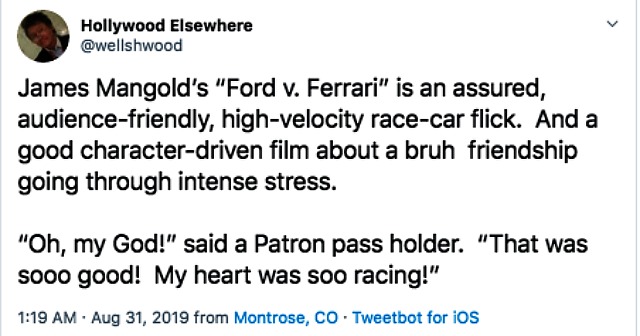
Ford v. Ferrari director James Mangold may not want to admit this but his film, which roars into highly pleasurable third-act overdrive during its depiction of the 1966 Le Mans race, owes a huge nostalgic debt to Steve McQueen‘s Le Mans (’71).
Shot in the summer and early fall of’70, Le Mans was an all-around calamity — box-office failure, critically drubbed (the atmosphere and versimilitude are top-notch but it’s a frustrating film in other respects) and a kind of spiritual end-of-the-road experience for McQueen himself.
Nonetheless the annual Le Mans races during that era (mid ’60s to early ’70s) are owned and imprinted by the McQueen legend, and if I’d been in Mangold’s shoes I would have inserted a very quick, very fleeting glimpse of McQueen’s Michael Delaney character…maybe driving, maybe hanging around, maybe watching from the stands. Just a little tap-on-the-shoulder acknowledgment.
Posted on 10.1.15: “Steve McQueen: The Man & Le Mans may seem at first glance like a standard nostalgia piece about the making of McQueen’s 1971 race-car pic, which flopped critically and commercially. (I own the Bluray but I’ve barely watched it — the racing footage is authentic but the movie underwhelms.) Yes, in some ways the doc feels like one of those DVD/Bluray ‘making of’ supplements, but it soon becomes evident that Clarke and McKenna are up to something more ambitious.
“What their film is about, in fact, is the deflating of McQueen the ’60s superstar — about the spiritual drainage caused by the argumentative, chaotic shoot during the summer and early fall of ’70, and by McQueen’s stubborn determination to make a classic race-car movie that didn’t resort to the usual Hollywood tropes, and how this creative tunnel-vision led to the rupturing of relationships both personal (his wife Neile) and professional (McQueen’s producing partner Robert Relyea, director John Sturges), and how McQueen was never quite the same zeitgeist-defining hotshot in its wake.”












